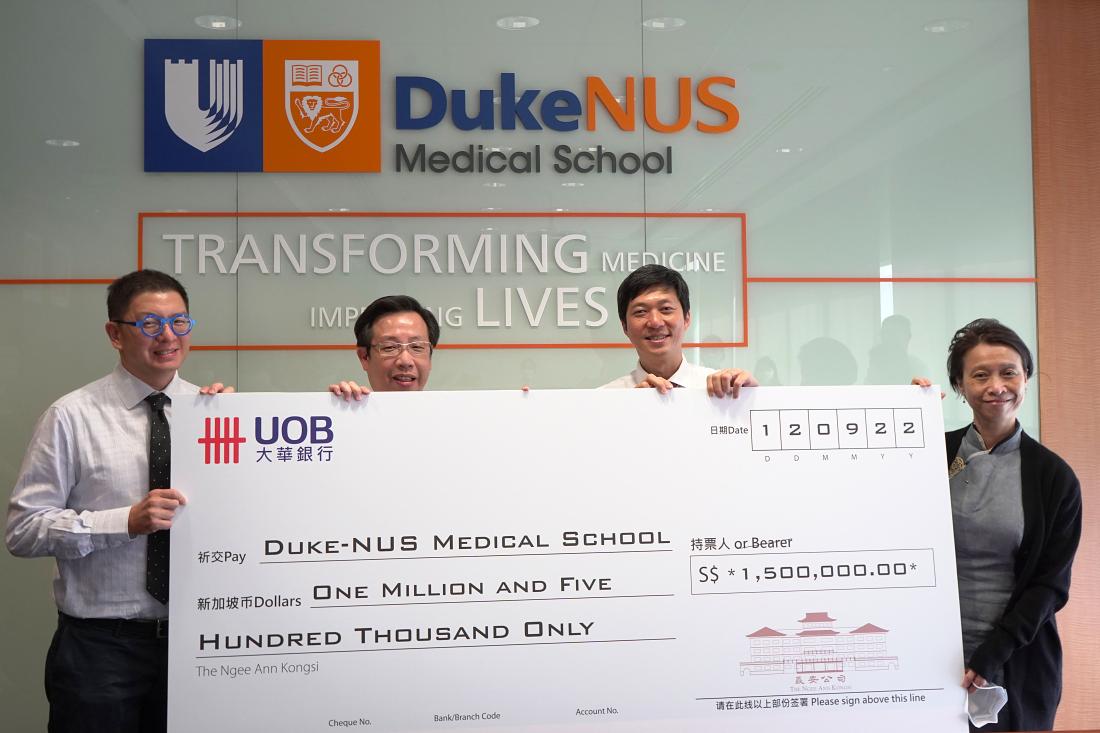Pictured from left: Mr Jamie Teo, Vice President and Chairman of the Donation & Charity Sub-Committee, and Mr James Teo Wee Wee, President, from The Ngee Ann Kongsi, and Associate Professor Au Wing Lok, Academic Chair of the SingHealth Duke-NUS Neuroscience Academic Clinical Programme, and Clinical Associate Professor Chow Wan Cheng, Vice-Dean, Office of Academic and Clinical Development, Duke-NUS Medical School.
SINGAPORE, 12 September 2022 – The Ngee Ann Kongsi today signed a Memorandum of Understanding with Duke-NUS Medical School with a pledge of up to $1.5 million to advance understanding in the emerging field of the human microbiome and its impact on the brain.
Recent discoveries have shown that some bacteria in the gut produce chemicals known as metabolites that can travel via the bloodstream to the brain. Some of these metabolites are toxic to brain cells and have been linked to neurodegenerative diseases such as Parkinson’s disease.
With support from the newly established ‘Gut Bacteria To Treat Chronic Brain Diseases’ Research Fund, researchers will identify specific bacteria and metabolites associated with neurodegenerative brain conditions. This will enable the discovery of potential new therapies to modify or remove harmful metabolites and/or change the composition of gut bacteria to prevent the production of such toxins.
“The Ngee Ann Kongsi has long supported and engaged Duke-NUS, and we are grateful for this commitment to advancing our research into this emergent area of study,” lauded Professor Thomas Coffman, Dean, Duke-NUS Medical School. “Through this programme, we aim to benefit people affected by neurodegenerative diseases in Singapore and beyond.”
Speaking this afternoon at The Ngee Ann Kongsi – Duke-NUS Signing Ceremony, Associate Professor Au Wing Lok, Academic Chair of the SingHealth Duke-NUS Neuroscience Academic Clinical Programme (Neuroscience ACP), described the need for such research as “very real” because there are currently limited treatments and no cures for these life-changing brain conditions.
“The Research Fund will go a long way in helping us to better understand, diagnose and treat such conditions, making a difference to the health and lives of patients today and for future generations to come,” said Assoc Prof Au.
This initiative comes at a timely juncture as Singapore faces a rapidly ageing population that will result in a higher prevalence of such diseases, explained Mr Jamie Teo, Vice President and Chairman of the Donation & Charity Sub-Committee, The Ngee Ann Kongsi.
“Through this Research Fund, The Ngee Ann Kongsi hopes to play a part in advancing academic medicine and medical research in chronic brain diseases that will improve the quality of care and life of the sufferers of brain diseases and their caregivers. We are proud to partner Duke-NUS on this journey, and we look forward to the developments that the Research Fund will bring to the medical community and to society at large,” said Mr Teo.
Research into the link between gut bacteria and brain health has gained momentum over the past 15 years. The findings from the Neuroscience ACP’s research will help to expand knowledge within this emerging field and provide vital local data, due to the impact of diet and the environment on gut bacteria.



